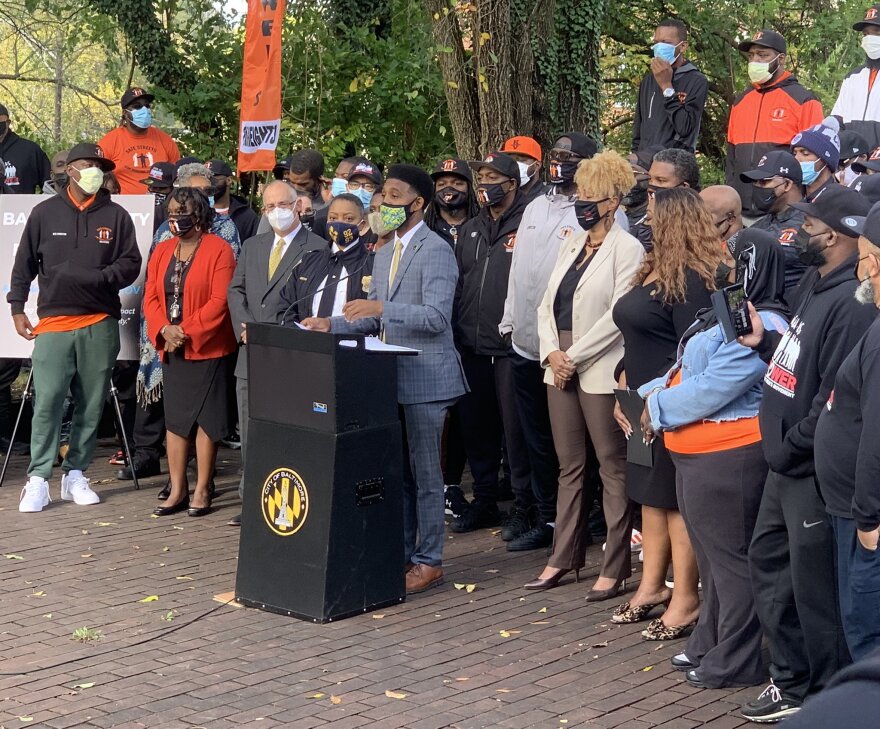Baltimore will put $50 million in American Rescue Plan Act funding toward violence prevention efforts over the next three years, including support for gunshot victims and citizens returning from prison, Mayor Brandon Scott announced Tuesday.
The allocation marks the second major initiative the Democrat has funded using $641 million in ARPA money. He announced $80 million for the city’s health department last week.
“Curing Baltimore’s violence is my top priority as mayor and the dollars we invest in today in this vision based on equity, healing, public health and trauma-informed practices will build safer neighborhoods today while paying even deeper dividends in the future,” Scott said at a news conference in Park Heights.
The money will flow toward the Mayor’s Office of Neighborhood Safety and Engagement (MONSE), which Scott established shortly after entering office last December.
“The streets, our residents and our neighborhoods are depending on us not only to end gun violence, but to also do the work further upstream associated with healing our communities, with providing real justice, with ensuring high quality lives for all Baltimoreans, regardless of their ZIP code,” MONSE Director Shantay Jackson said. “We're only able to do this when we all come together to co-produce public safety. We're more powerful when we work together.”
She said $22 million will go toward gun violence prevention. MONSE will put some of the funding toward more than 30 grants and contracts to community-based organizations, such as Safe Streets, which hires trusted community members to mediate conflicts at risk of becoming violent.
“It's not just about stopping that one incident,” Scott said. “It's about getting those folks the help that they need.”
The performance metrics for the funding include overall crime statistics and the number of conflicts mediated by funded programming, said Shamiah Kerney of the Mayor's Office of Recovery Programs. The office oversees ARPA money distribution.
Jackson said that Safe Streets mediates about 2,000 conflicts each year; the figure does not include mediations by groups that perform similar work, such as We Are Us.
The gun violence prevention funding will also support the creation of neighborhood policing plans, which Scott described as “strategies tailored to specific neighborhoods that give residents more of a say over how police respond to calls for service.”
Another $14 million will go toward re-entry support. One performance metric will measure how many returning residents get connected to jobs; Jackson said that MONSE does not currently fund similar programming.
“We roughly have about 1,900 folks who return back to Baltimore City every single year, and the contract that we're negotiating with [the Maryland Department of Public Safety and Correctional Services] will allow us to have pre-employment behind the wall for close to 3,000 of those individuals,” Jackson said.
Scott also will put $5 million toward community healing and trauma-informed care, including support for gunshot victims. Jackson pointed to the University of Maryland’s Rebuild, Overcome, and Rise (ROAR) Center, which provides survivors of crime with a full range of support services, including nurse care management, legal aid and mental health services.
Jackson noted the support that ROAR provided a 23-year-old Black man who survived a gunshot wound; after the shooting, he struggled with depression and wore an ostomy bag as a result. Nearly 10 months passed between the shooting and his intake with ROAR.
“Most of his pressing issues, he didn't know how to get help with,” Jackson said. “He knew that he needed to get a new oscopy bag, but he was embarrassed to leave his house because of the smell.”
Jackson said that ROAR provided him with a nurse and therapist, helped him arrange a surgery to reverse the colostomy and connected him to a job training program that led to employment. The center’s attorney also assisted him and his mother, with whom he now lives, to receive housing assistance.
“These are the critical supports that are required to ensure that survivors of gun violence survive,” Jackson said.
Another $500,000 will go toward juvenile justice. Another $6 million will provide administrative support for the projects; Jackson said MONSE would expand staffing and operating hours of some violence prevention and support centers, such as the Baltimore Visitation Center
Community-based organizations engaged in the work spelled out in Tuesday’s allocation — community violence intervention, victim services, youth justice, community healing and re-entry support — may apply for grants through MONSE for the funding. Applications will be accepted and reviewed on a rolling basis based on funding availability, according to a news release.



